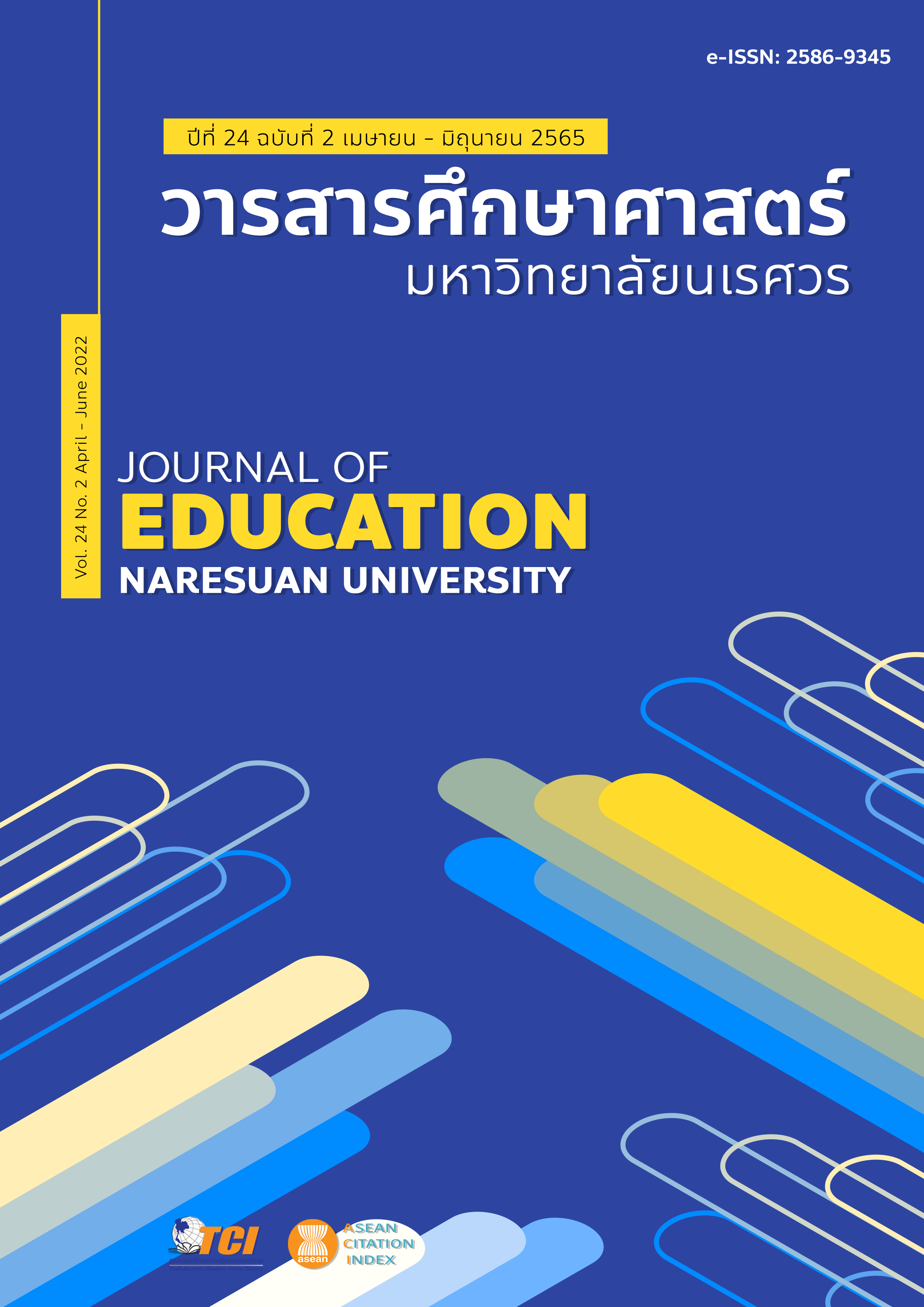EFFECT OF THAI LANGUAGE LEARNING ACTIVITIES BY USING 5-STEP PROCESS ON ANALYTICAL THINKING FOR GRADE 9 STUDENTS ผลของการจัดกิจกรรมการเรียนรู้ภาษาไทยโดยใช้กระบวนการ 5 ขั้น ที่มีต่อความสามารถ ในการคิดวิเคราะห์ ของนักเรียนมัธยมศึกษาปีที่ 3
Main Article Content
Abstract
The objectives of this research were 1) study the quality of Thai language learning activities by using 5-step process for developing capacity of analytical thinking for grade 9 students, 2) study the efficiency of Thai language learning activities by using 5-step process for developing capacity of analytical thinking for grade 9 students, and 3) compare student’s analytical thinking between the students studying Thai language by using 5-Step Process learning activities and the students studying Thai language by using conventional method. The sample in this study consisted grade 9 students studying in 2 classrooms at Sukum Navapan Uppathum School in Bangkok. The participants were selected by cluster random sampling method. The instruments employed in this study were the instructional plan for Thai language learning activities by using 5-step process, quality assessment form of instructional plan for Thai language learning activities by using 5-step process, analytical thinking ability test obtaining, difficulty at 0.53 - 0.76 and discrimination power at 0.21 - 0.68. In addition, the reliability was 0.81. The statistical methods used in data analysis were Mean score (), Standard Deviation (S.D.) and Independent sample t-test. The results of the research show that 1) the level of the quality of instructional plan for Thai language learning activities by using 5-step process was very good (
= 4.50, S.D. = 0.02), 2) the efficiency of instructional plan was 87.45/84.25 followed in specified criteria 80/80 and 3) the analytical thinking ability of grade 9 students who studied Thai language by using 5-Step Process learning activities was higher than grade 9 students who studied Thai language by using conventional method with statistical significant at the .05 level.
Article Details

This work is licensed under a Creative Commons Attribution-NonCommercial-NoDerivatives 4.0 International License.
The owner of the article does not copy or violate any of its copyright. If any copyright infringement occurs or prosecution, in any case, the Editorial Board is not involved in all the rights to the owner of the article to be performed.
References
Anderson, L. W., & Krathwohl, D. R. (2001). A taxonomy for learning, teaching and assessing: A revision of bloom’s taxonomy of education objective. New York: Longman.
Angkhasanyalak, Y. (2016). Effects of organizing Thai language activities by using 5-step process on analytical thinking ability and active learning attitudes of tenth grade students (Master thesis). Bangkok: Chulalongkron University. [in Thai]
Baeseiw, K. (2019). The development of analytical reading abilities on prose works of mathayomsuksa 3 students by using 5-step process and semantic mapping strategy. Journal of Education Srinakharinwirot University, 20(1), 1–14. [in Thai]
Bauthong, S. (2017). Measurement and assessment learning skills in the 21st century. Humanities, Arts and Social Sciences Studies, 10(2), 1856-1866. [in Thai]
Best, J. W., & Kahn, J. V. (1993). Research in education (7th ed.). Boston: Allyn and Bacon.
Bloom, B. (1956). Taxonomy of educational objectives, handbook I: The cognitive domain. New York: David McKay.
Brahmawong, C. (2013). Developmental testing of media and instructional package. Silpakorn Educational Research Journal, 5(1), 7–19. [in Thai]
Chani, S. (2013). Developing of innovation in teaching thai language for cognitive acceleration of analytical thinking skill in Mathayomsuksa 3 students (Master thesis). Songkhla: Thaksin University. [in Thai]
Chitchayawanit, K. (2019). Learning management. Bangkok: Chulalongkron University. [in Thai]
Fink, L. D. (2003). A self-directed guide to designing courses for significant learning. Retrieved August 9, 2019, from http://www.finkconsulting.info/files/Fink2005SelfDirectedToCourseDesine.Doc
Khaengkhan, P. (2010). Thai language at secondary level. Bangkok: Chulalongkron University. [in Thai]
Leekitchwatana, P. (2016). Educational research (10th ed.). Bangkok: Mean Service Supply. [in Thai]
Limbach B., & Waugh W. (2010). Developing higher level thinking. Journal of Instructional Pedagogies, 3(1), 1-9.
National Institute of Educational Testing Service (Public Organization). (2018). The result of the Ordinary National Educational Testing (O-NET) grade 9. Bangkok: National Institute of Educational Testing Service (Public Organization). [in Thai]
Phinla, W. (2017). Learning management process of social students teachers in the development of critical thinking among students in the 21st century. Journal of Education Naresuan University, 18(14), 349–359. [in Thai]
Phornkul, C. (2011). Teaching thinking process theory and application (3rd ed.). Bangkok: V Print (1991). [in Thai]
Plettikul, S. (2015). Quality of students derived from active learning process. Journal of Educational Administration Burapha University, 6(2), 1-12. [in Thai]
Sinlarat, P., & Fakkhaw, S. (2017) How to teach and create analytical? (2nd ed.). Bangkok: Chulalongkron University. [in Thai]
Siripoobal, R. (2010). Process for writing a quality Learning management plan. The Journal of Academics Affairs Ministry of Education, 2(11), 19–23. [in Thai]
Sukum Navapan Uppathum School. (2018). Annual report of school 2018. Bangkok: Sukum Navapan Uppathum School. [in Thai]
Sutthinarakorn, W. (2017). The future of Thai education in the context of Thailand 4.0 in Mr. Aphisit Vejjajiva’s perspective. Kasetsart Educational Review Kasetsart University, 32(1), 47–50. [in Thai]
The Institute for the Promotion of Teaching Science and Technology. (2015). The assessment Result of the PISA 2015, literacy scientific, literacy reading, and literacy mathematical (Complete version). Bangkok: Success Publication. [in Thai]
Thongard, C. (2018). Thai language Learning management by using 21st century competencies-based: theory to practice. Journal of Education Studies Chulalongkron University, 46(1), 171–184. [in Thai]
Thongphiw, W. (2013). The development analytical thinking skills by use graphic organizer instructional model for grade 9 students (Master thesis). Bangkok: Rajamangala University of Technology Thanyaburi. [in Thai]
Wiboolyasarin, W. (2014). Innovation and instructional media of Thai language (2nd ed.). Bangkok: Chulalongkron University. [in Thai]


